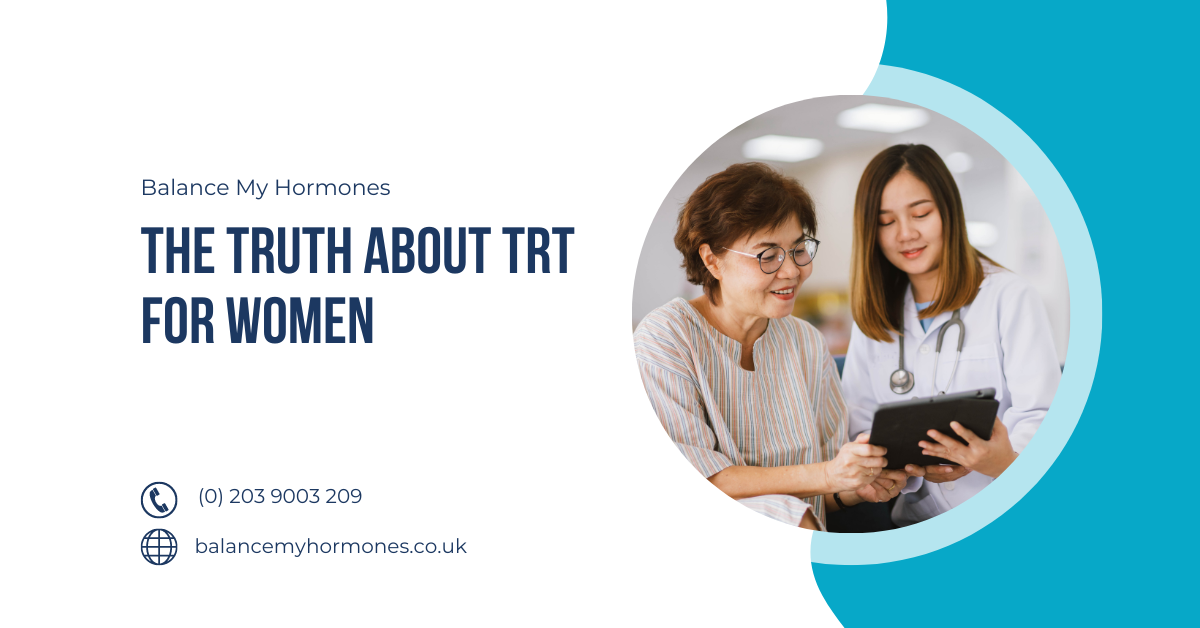TRT in the UK and EU | Contact: +44 (0) 203 9003 209 | Login
TRT in the UK and EU | Contact: +44 (0) 203 9003 209 | Login
Medically Reviewed by Dr. George Touliatos
When the term “menopause” comes to mind, it’s often associated exclusively with women. However, a condition known as andropause, more informally referred to as ‘male menopause,’ shares striking similarities with its female counterpart. While not technically classified as menopause, andropause manifests many of the same symptoms, earning its nickname as the male version of this hormonal transition. These symptoms are recognised in men experiencing challenges in testosterone production or grappling with conditions like testosterone deficiency, otherwise known as hypogonadism.
Andropause typically involves a decline in testosterone production, particularly prevalent in men aged 50 or older, though it’s not exclusive to this age group. Hypogonadism emerges as a common factor contributing to this decline, leading to low testosterone levels and the array of symptoms associated with testosterone deficiency.
Testosterone is the most important hormone produced in the body of men, and it contributes to many of the healthy bodily functions that men experience every day. Testosterone is exclusively produced in the testes. If they are not producing as much testosterone as they should it can lead to a hormone imbalance in the body. While many people associate testosterone with simply being in charge of fueling sex drive, that is far from the only thing that it is responsible for. It helps to regulate puberty, mental and physical energy levels, maintaining and increasing muscle, emergency response instincts and also has a hand in countless other bodily processes.
While male menopause and female menopause share the title of menopause, the cycles that men and women go through during this time are quite different. The main difference is that not all men experience menopause, while all women are subject to menopause. Another difference is that the men who do go through male menopause do not experience a complete shutdown of the reproductive organs. Though it can affect sex drive and sexual function heavily.
Unfortunately, the symptoms of male menopause are very broad and can affect many parts of the body and mind. Additionally, they worsen with age, meaning it could become an ongoing issue that continues to develop. Here are the symptoms, both physical and mental, that one might expect when going through male menopause.
Since testosterone plays a large role in making sure that the bodies of men function properly, low testosterone can have physical consequences that are less than pleasant.
One of the main symptoms that you might experience is low energy. This can also contribute to decreased motivation in your personal and professional life and lead you to be less productive and less driven.

With a less regulated body and more irregular body functions, low testosterone can also contribute to raising the amount of body fat that you have and put you in worse physical shape overall. These effects also transmit to muscle mass and strength, since testosterone also plays a large part in developing muscles and providing muscular strength to the body.
Since testosterone is the main hormone for male development, low testosterone could lead to slowed or underdevelopment of the body. Without proper testosterone levels, it is possible that men could develop breasts (gynecomastia). This also will come with a decreased sex drive and possibly problems achieving or maintaining an erection.
While the physical symptoms of male menopause and low testosterone are often severe and challenging, it’s crucial to recognise the significant impact on mental well-being. Testosterone, a vital hormone for both the body and mind, plays a key role in maintaining a healthy balance and regulating mood and emotions. When testosterone levels are insufficient, this delicate balance is disrupted, affecting emotions and moods in various ways.
One prominent mental side effect of low testosterone and male menopause is depression or persistent sadness. The resulting chemical imbalance in the brain can lead to heightened feelings of sadness and depression, serving as an important indicator that male menopause or low testosterone may be occurring.
Beyond depression, another emotional symptom often experienced is a notable lack of motivation and drive. Adequate hormone levels typically establish a baseline of motivation and drive, which diminishes when testosterone levels are insufficient.
Whether manifested as a distraction due to male menopause or restlessness, many men undergoing this phase also struggle with a diminished ability to concentrate. This difficulty in focusing can impede productivity and happiness, disrupting the harmony in both personal and professional aspects of life.
| Lack of energy | Loss of motivation | Low libido (sex drive) |
| Brain fog | Increased body fat | Irritability |
| Loss of confidence | Poor sleep cycles | Weak erections |
| No morning erections | Facial hair loss | Lack of concentration |
| Fatigue | Sleep apnea | Depression |
If you want to combat your male menopause and reverse the symptoms that you might be experiencing, then the first step is diagnosing the condition in the first place. Diagnosing ‘male menopause’ is difficult since it’s not a technical medical term. However, the underlying conditions that cause it to happen are much easier to diagnose. To start, your doctor simply needs to take a blood sample to test the amount of testosterone in your bloodstream. This will give the doctor insight into what levels your testosterone is at and whether they are appropriate for your age and other factors in your life.
Though identifying male menopause is pretty simple and easy, the treatment is the hard part of the process. The reason that treatment can be difficult for low testosterone conditions is that there are a variety of reasons that could cause low testosterone. For most of the men who are experiencing male menopause, they are experiencing it as a result of age. It is a known fact that a decline in testosterone levels in men over time is a natural and normal thing to occur. That is why you shouldn’t be too concerned if you are experiencing low testosterone as an ageing man.

However, if you are experiencing low testosterone at a younger age, there are some actionable steps that you can take to combat those effects. You can get testosterone replacement therapy, which is a therapy that is designed to supplement the testosterone in your body through testosterone injections or another method. This regulates the amount of testosterone in your body and mitigates the side effects of low testosterone. In addition, you can take natural treatment steps to combat low testosterone and ensure that you are putting your body in the best position possible to produce the right amount of testosterone.
If you are experiencing male menopause or are concerned about the issue of low testosterone, then being informed is your greatest weapon. With the information that you now have, you should be able to identify low testosterone, know which questions to ask your medical professional, and gain more insight into the treatment options that you have for low testosterone.
How long does male menopause last?
Men start to produce 1% less testosterone a year once they reach the age of 30+ so unfortunately, the symptoms associated with male menopause will not go away unless you opt for TRT.
What is the male menopause age?
As the body decreases testosterone production by 1% each year, you could experience the symptoms above at any time after this, however they can become more severe in your late 30s and 40s.
Is there a male menopause?
Yes, this condition does exist and is far less known and talked about compared to female menopause, however, awareness for the condition is starting to increase.
Male menopause and the NHS
The NHS don’t often treat this condition and have less knowledge on the subject than our specialist doctors, so we would advise speak to us rather than the NHS.
Male menopause and hot flashes
As your hormones adjust with age or if you have a hormone imbalance you may experience hot flashes, we advise having one of our comprehensive blood tests to check your overall hormonal health and bodily functions.
Male menopause and depression
Testosterone levels play an important role in mood control and can affect depression, confidence, sexual urges and more.
What are the signs of male menopause?
Please review our symptoms table above for a full list of signs and symptoms associated with male menopause, these can range from low libido, fatigue, and body fat to depression and sleep issues.
The below links are scientific references, resources to perform further analysis and reading along with studies that have been conducted:
https://www.nhs.uk/conditions/male-menopause/
https://www.healthline.com/health/menopause/male
https://www.medicinenet.com/male_menopause/article.htm
This article has been researched and written based on scientific evidence and fact sheets that have then been crossed checked by our team of doctors and subject matter experts.
References, sources and studies used alongside our own in-house research have been cited below, most of which contain external clickable links to reviewed scientific paper that contain date stamped evidence.
Our team of healthcare experts and GMC registered doctors are licensed to UK GMC standards. We strive to provide you with the latest evidence based, researched articles that are unbiased, honest and provide you with accurate insights, statistics and helpful information on the discussed topic to ensure you gain a better understanding of the subject. You can read more about our Editorial Process by clicking here.
We value your feedback on our articles, if you have a well-researched paper you would like to share with us please contact us.
If you know your total testosterone reading from a previous blood test input the results to the left above to see if your testosterone levels are normal.
You may have low testosterone depending on the symptoms you have, please contact us to find out how we can help.
The Total Testosterone Level You Entered Is Incorrect. Figure Must be in nmol/L you can use our converter here.
Your testosterone levels appear to be in the normal range.
You must be over 38, have had your ovaries removed or have suffered with premature menopause to warrant further hormone tests.
Please contact us to discuss your hormones, we need your total testosterone levels to validate your hormone deficiency. You can order a blood test here.
You may have low testosterone depending on the symptoms you have, please contact us to find out how we can help.
You appear to have higher than normal testosterone levels, please contact us for further investigation.
You appear to have normal testosterone levels. Contact us if you have any concerns.

Male sexual problems (also called sexual dysfunction) prevent a man or his partner from enjoying sexual activity. They affect around 31% of men and can happen any time in their lives. But the good thing is most of them are treatable. Advanced technologies and methods have now made it easier for doctors to understand these issues, […]

Testosterone replacement therapy (TRT) has long been associated with men trying to restore hormonal balance and combat the effects of ageing. However, the use of TRT is not limited to men alone. More and more women are now turning to this therapy to treat different medical conditions and improve their quality of life. Despite the […]

Testosterone is important for the normal functioning of various organs, such as muscles, bones, and sex organs. However, its levels do not stay the same throughout a man’s life for various reasons. Some men become testosterone deficient if they have serious underlying health issues such as tumours while others may develop testosterone deficiency as they […]
Balance My Hormones helps customers restore their hormones to optimal levels through bespoke TRT and HRT treatment plans. We use modern American treatment methods and have over 25 years of experience in hormonal health which is backed up by our very own GPhC pharmacy.